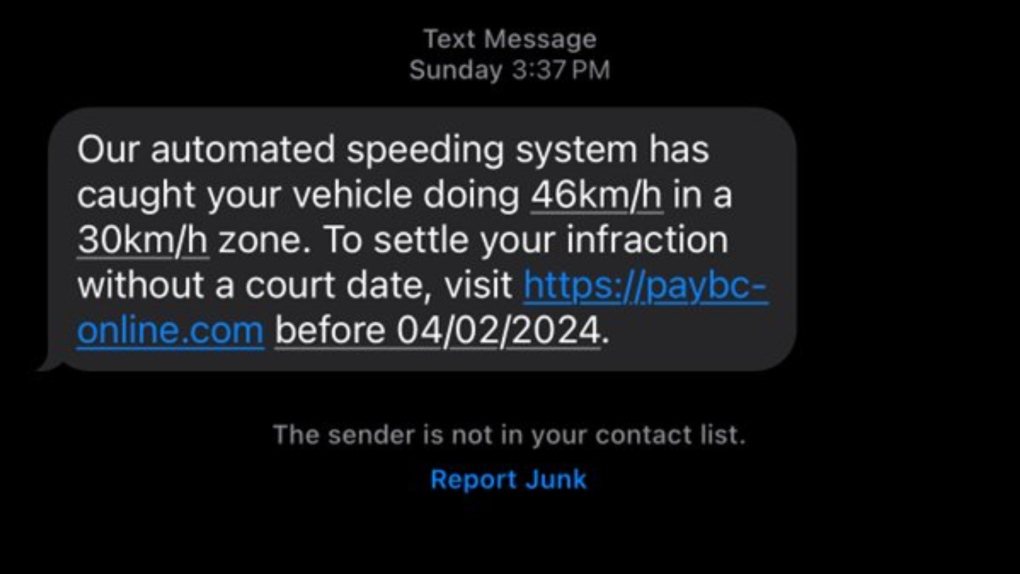That text message about a traffic ticket? It's fake, ICBC says
 ICBC shared this image of a fraudulent text message with its social media post. (X.com/icbc)
ICBC shared this image of a fraudulent text message with its social media post. (X.com/icbc)
ICBC wants you to know it will never text you to seek payment for a traffic ticket. So does the provincial government, and the City of Vancouver.
All three entities have posted public warnings on social media this week about text message phishing scams impersonating them.
ICBC shared an image of a text message claiming that the recipient's vehicle had been caught "doing 46 km/h in a 30 km/h zone" and including a link that purported to allow the recipient to settle the matter "without a court date."
"If you receive the text message about a traffic violation, please ignore or delete the message, as it is a scam," ICBC wrote in its post Tuesday.
"We do not send text messages to customers about traffic violation tickets or payment requests."
The B.C. government chimed in with a warning of its own on Thursday, noting that the link appeared to be imitating its PayBC portal, and advising anyone who receives such a text to report it via the federal government's Get Cyber Safe program.
"The scam comes as a text message about an outstanding speeding ticket," the province's post reads. "It is fraudulent. We don't contact people about speeding tickets via text message, nor does ICBC."
The City of Vancouver shared a similar warning on Thursday, saying it had been notified of a text message scam claiming the recipient has an overdue parking ticket.
The city included a link to its website, which notes that the city's only approved notification methods for parking violations involve physical tickets left on vehicles or sent in the mail.
"We do not notify the public of fines through texting, media, or social media," the city said.
The three entities' warnings come in the same week that Surrey RCMP announced residents of that city had lost more than $15 million to cryptocurrency-related frauds over the last 14 months.
CTVNews.ca Top Stories

BREAKING Singh says the NDP 'will vote to bring this government down' in new letter
After months of being non-committal, in a new letter, NDP Leader Jagmeet Singh says his caucus 'will vote to bring this government down,' sometime in 2025.
WATCH LIVE 4 ministers get new portfolios, 8 Liberal MPs promoted in Trudeau cabinet shuffle
Prime Minister Justin Trudeau added eight Liberal MPs to his front bench reassigned four ministers in a cabinet shuffle in Ottawa on Friday.
Weather alerts in effect across Canada: Freezing rain, snow, extreme cold
Environment Canada has issued a series of winter weather alerts from Edmonton to St. John's as freezing rain, snow squalls and extreme cold blanket parts of the country.
Joss Stone says she's discovered she's pregnant – just weeks after adopting a baby
Joss Stone has revealed that she is pregnant, just weeks after she and her husband adopted a baby boy.
A new book about Chrystia Freeland just came out. Here's what we learned
A new book about Chrystia Freeland has just come out, after the publishing company sped up its release date by a few months. CTV News sifted through the book and pulled out some notable anecdotes, as well as insights about Freeland's relationship with the prime minister.
U.S. recalls 600K car seats, fix available to Canadians
Nuna Baby Essentials is recalling nearly 609,000 child car seats because the harness adjuster can loosen and the seats may not restrain children.
Man arrested in Quebec for alleged plot to kill Jews in NYC transferred to Montreal
A Pakistani man arrested in Quebec for an alleged plot to kill Jews in New York City has been transferred to a provincial detention centre in Montreal from Rimouski, Que.
'Lowlifes': B.C. family outraged over theft of outdoor Christmas decorations
Security footage from a home in Vancouver’s Kerrisdale neighbourhood clearly shows a man grabbing Christmas decorations from the front lawn, and then casually walking away with them.
'Concerned, frustrated, in fear': Renewed calls for government to address antisemitism after third gunfire incident at Toronto Jewish school
A Jewish elementary school in Toronto has been struck by gunfire for the third time in the last seven months.






























